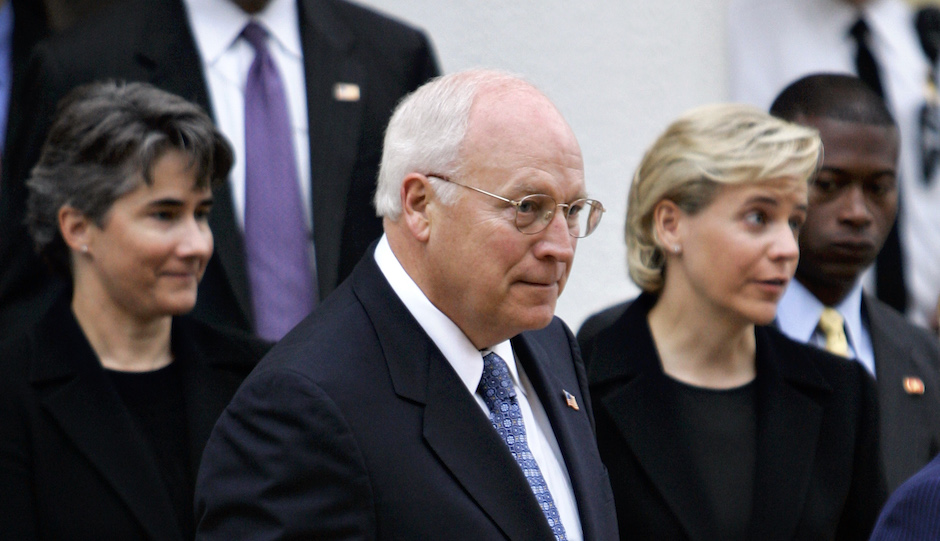The Dick Cheney-ization of America

Vice-President Dick Cheney is joined by his openly gay daughter Mary, at right, and her partner of 15 years, Heather Poe, left, as they attend church services in Washington, Monday, September 11, 2006. (AP Photo/J. Scott Applewhite)
Back in 2004, then-Vice President Dick Cheney horrified conservatives when, at a town-hall meeting in Iowa, he came out in favor of gay marriage, a stance at odds with then-President George Bush, who at the time was advocating a constitutional amendment to ban such banns. “Lynne and I have a gay daughter,” Cheney announced, “so it’s an issue that our family is very familiar with. … With respect to the question of relationships, my general view is that freedom means freedom for everyone. People ought to be able to be free … ought to be free to enter into any kind of relationship they want to.” Eleven years later, the U.S. Supreme Court agreed.
What happened in the interim? People like Cheney’s daughter Mary publicly came out and wrote and sang and talked about their lives, and the six degrees of separation Americans liked to pretend existed between them and homosexuality gradually vaporized, became five degrees, then four, then one. If you didn’t have a child or a parent or a friend who was gay, you knew someone who did—someone you were close to. The other nudged closer and closer until she was teaching your class and sitting at your Thanksgiving table and staying at your beach house. And even if you sort of didn’t get what those people did in their bedrooms, so what? They didn’t care what you did in yours.
There’s a John Ciardi poem that begins:
Men marry what they need. I marry you
Morning by morning, day by day, night by night,
And every marriage makes this marriage new.
That’s how I’ve always thought about the institution: The more, the better. How could it possibly be harmful for more people to commit to loving one another until death parts them? How could God be unhappy about that?
The same process of familiarization is unrolling when it comes to Obamacare. Maybe you get your insurance through your employer, and you thought: Why should I pay taxes so other people who don’t even take care of themselves can be insured? But then you realized: One of those people is your neighbor with diabetes, the one who always shares his tomato harvest with you. Another is your daughter, who can stay on your health-insurance policy for a few more years while she gets settled into life after college. Another is your sister-in-law who got through breast cancer but then was uninsurable because of her preexisting condition. The weave of the social fabric draws tighter and tighter, and you find yourself thinking something altogether different: What will they do if Obamacare goes away?
A few years ago, when Ohio’s Rob Portman became the first Republican in the U.S. Senate to support same-sex marriage after his son announced he was gay, Paul Waldman complained in the American Prospect that all of us, and especially lawmakers, should be bigger than this—that it shouldn’t take personal experiences with divisive issues to propel us to do the right thing. The point, he wrote, is “that we should be able to appreciate people’s full humanity whether we know them or not.” Yes, of course we should. But we don’t, always. And even if we do, that appreciation is distanced and theoretical; it doesn’t hit home the way that a threat to a loved one’s life, liberty or pursuit of happiness will.
But with every Mary Cheney and Ellen Degeneres and Frank Ocean and Michael Sam and Brian Sims and the boy- and girl-next-door, the tangle of connections grew like topsy. That’s why public approval of same-sex marriage seemed to zoom from zero to 60 percent overnight. One minute Bill Clinton was signing the Defense of Marriage Act, and the next minute there were rainbows over the White House. As Justice Kennedy wrote, “In forming a marital union, two people become something greater than once they were.”
And in recognizing the right of all of us to form such unions, society itself becomes greater than it was—more inclusive, more embracing, more just, more kind, more fair. The love in #LoveWins isn’t just that of committed couples for each other. This was a victory for love of every hue and form—mother for child, sister for brother, neighbor for neighbor, humankind for humankind. In the end, it doesn’t really matter how we get there as long as we do. The Gayborhood slapped those rainbow sidewalks down just in time.
Follow Sandy Hingston on Twitter.


